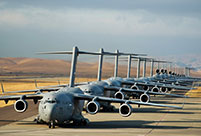 If you like autumn, put your hands in the air!
If you like autumn, put your hands in the air!
 Fan Bingbing's "Queen style" in new play
Fan Bingbing's "Queen style" in new play
 Lingerie show at 2014 Miss China
Lingerie show at 2014 Miss China
 J-10 fighters show aerobatic stunts in smog-free sky
J-10 fighters show aerobatic stunts in smog-free sky
 Charming contestants of Shanghai Int’l Model Contest
Charming contestants of Shanghai Int’l Model Contest
 Most amazing chi-pao beauties
Most amazing chi-pao beauties
 7 deadly animal attacks
7 deadly animal attacks
 Picturesque autumn scenery of Hongshan Army Horse Ranch
Russia to launch 70 Proton rockets by 2020: official
Picturesque autumn scenery of Hongshan Army Horse Ranch
Russia to launch 70 Proton rockets by 2020: officialBEIJING, Oct. 30 -- Spillovers of the end of the U.S. Federal Reserve's quantitative easing (QE) stimulus program are set to add difficulties to the Chinese economy, which has seen substantial downward pressure this year, economists have warned.
The Fed said overnight on Wednesday that it had decided to end its monthly asset-purchase program, as it "continues to see sufficient underlying strength in the broader economy to support ongoing progress toward maximum employment in a context of price stability."
HSBC chief China economist Qu Hongbin shared on Sina Weibo, the Chinese equivalent of Twitter, that the Fed's decision marked an end to the 6-year-old policy, launched during the financial crisis in 2008.
QE, despite its faults, has helped the U.S. economy recover gradually. In comparison, the Eurozone economy is facing a second downturn, Japan's recovery seems to be short-lived and the Chinese economy is preparing for downward pressure, Qu said.
The U.S. dollar index rose by around 1 percent following the QE announcement. A strong U.S. dollar is likely to result in the appreciation of the Renminbi against other currencies, which is set to put more pressure on China's slowing economy, he said.
China's economy, the second largest in the world, slowed to 7.3 percent in the third quarter of 2014, the slowest quarterly growth since 2009/Q1.
Guan Qingyou, senior analyst at Minsheng Securities, predicts a strong U.S. dollar in the medium and long term; bearish gold market; and continuously sluggish commodity prices following the end of QE.
China's yuan funds outstanding for foreign exchange are expected to continue dropping, which will force the People's Bank of China (PBoC), the central bank, to change money supply channels, Guan said.
The PBoC is expected to continue using such monetary policy instruments as re-lending, pledged supplementary lending (PSL) and standing lending facility (SLF) next year, he said.
The PBoC has been using these instruments over the past few months to inject cash into the market and to ease liquidity.
Guan also said the end of QE will have a negative impact on the recovery of exports, and China might have to take more growth-supportive measures and expedite reforms.
The U.S. economic recovery this time comes alongside trade rebalance measures, so the U.S. recovery is not likely to push up China's exports, he said.
On the contrary, China's exports will face more pressure given the Renminbi appreciation against other currencies.
The Chinese economy will have to rely more on internally-driven growth, so more mini-stimulus measures and more reform exploration, via the free trade zone, are likely, Guan added.
Chinese President Xi Jinping on Monday said the experience gained from the Shanghai Free Trade Zone, since its launch in September last year, "should be replicated as soon as possible".
Ma Guangyuan, an independent Beijing economist, said the end of QE would mark a historical turnaround in U.S. monetary policy leading toward a solid recovery of the U.S. economy.
The impact of the end of QE on emerging markets has just begun. Two things are certain -- the flow of dollar funds from emerging markets to the U.S. and a strong U.S. dollar, Ma said.
"These will impact China," he said. "There is not much room for China to make monetary policy mistakes."
Former Fed chief economist David Stockton, however, played down the impact the exit will have on China.
The removal of the Fed's accommodation will have varied affects on different emerging-market economies.
"For China, the spillovers are likely to relatively minimal, as China has little dependence on foreign capital inflows. But for other emerging market economies, the spillovers may prove more painful," he said.
"Investors around the world should prepare for a period of heightened volatility [...] Even if the Fed is ultimately successful, there will likely be many many bumps along the path to normalization," Stockton added.
 World Pole Dance Championship in China
World Pole Dance Championship in China U.S. air force transport planes row up on base
U.S. air force transport planes row up on base Post-85s female pilots and their mission
Post-85s female pilots and their mission Century-old public bath closes door in Beijing
Century-old public bath closes door in Beijing Shocking! Photos of Chinese fighters revealed
Shocking! Photos of Chinese fighters revealed World's most intimidating nuclear weapons
World's most intimidating nuclear weapons Standard faces for each countries in the world
Standard faces for each countries in the world Netizens fall in love with champion swimmer Ning Zetao
Netizens fall in love with champion swimmer Ning Zetao Vibrant 21-year-old and her own Cheongsam brand
Vibrant 21-year-old and her own Cheongsam brand Top 10 most dangerous jobs in the world
Top 10 most dangerous jobs in the world  Top 10 fifth generation jet fighters in the world
Top 10 fifth generation jet fighters in the world Top 10 Chinese goddesses
Top 10 Chinese goddesses  Top 20 hottest women in the world in 2014
Top 20 hottest women in the world in 2014 Top 10 pure beauties in showbiz
Top 10 pure beauties in showbiz  Top 10 world's highest-paid models 2014
Top 10 world's highest-paid models 2014 The most gorgeous Chinese women
The most gorgeous Chinese women Top 10 most handsome faces in Asia
Top 10 most handsome faces in AsiaDay|Week|Month